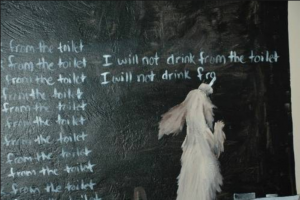 All FYS courses are writing-intensive, which means that by the end of the course you will have produced at least 5,000 words of “finished” writing (equivalent to about 20 double-spaced pages). “Finished” writing is writing that has been produced in drafts and revised in response to feedback from readers. As you might guess, in order to end up with 20 “finished” pages, you will be doing a lot of writing and a lot of revising. Because much of the writing you do will be informal or in progress, I will not put grades on individual assignments. Instead, I will provide feedback on drafts of essays and blog posts in response to which you will revise them. You will not be required to revise informal writing assignments, but I will periodically collect and respond to them. At midterm and again at the end of term, I will ask you to prepare a portfolio of your work and suggest a grade for the portfolio as a whole (based on the criteria outlined here). Be sure that you proofread all written work before you turn it in.
All FYS courses are writing-intensive, which means that by the end of the course you will have produced at least 5,000 words of “finished” writing (equivalent to about 20 double-spaced pages). “Finished” writing is writing that has been produced in drafts and revised in response to feedback from readers. As you might guess, in order to end up with 20 “finished” pages, you will be doing a lot of writing and a lot of revising. Because much of the writing you do will be informal or in progress, I will not put grades on individual assignments. Instead, I will provide feedback on drafts of essays and blog posts in response to which you will revise them. You will not be required to revise informal writing assignments, but I will periodically collect and respond to them. At midterm and again at the end of term, I will ask you to prepare a portfolio of your work and suggest a grade for the portfolio as a whole (based on the criteria outlined here). Be sure that you proofread all written work before you turn it in.
Here are the kinds of writing assignments you can expect to encounter in this course.
- Short, informal writing during class meetings or for homework to focus your responses on the assigned texts and/or explore relevant issues as they arise.
- Field notebook (2 entries/week) for recording observations of all things dog-related: dog behavior, dog-human interactions, dog-related current events, scientific discoveries about dogs, etc.
- 4 blog posts (450-500 wds ea) revised from field notebook entries and uploaded to our course website. Each of you will be assigned specific days to post.
- 2 writing projects (1250-1750 wds/ea) in which you will explore further constructions of the domestic dog and dog-human relationships encountered in the reading.
- Project 1 (midterm): “A Dog’s-Nose View” in which you explore Alexandra Horowitz’s ideas about the canine umwelt by observing one of my dogs out for a walk.
- Project 2 (end-of-term): An audio essay crafted from an interview with a member of the Lafayette faculty or staff about his or her dog. For this project you will work with a partner. Your essay will become part of the “Dogs of Lafayette” project– a collection of audio essays profiling human-dog relationships on our campus.
- 2 portfolio reflection papers (750 wds/ea) in which you discuss and reflect on the writing submitted with each portfolio and what that writing demonstrates about your learning.
Writing Conferences
All FYS courses are affiliated with the College Writing Program (CWP) which provides Writing Associates (WAs) for individual sections. WAs are students from across the College trained to provide feedback on your writing. They are not editors or proofreaders, but rather expert readers of work-in-progress who will provide feedback and ask questions that help you better communicate your intentions in writing. The WA assigned to our course is Josh Chait. Josh will meet with each of you four times this semester during weeks announced in advance (normally 7-10 days before a draft or revision deadline). He is obliged to inform me about any missed meetings. Missing a WA conference counts the same as missing a class.
In addition to 4 conferences with the WA, you’ll also have 3 or 4 conferences with me to discuss your writing-in-progress. Sign-up schedules for all conferences will be available on our Moodle page about 5-7 days before conferences are scheduled to begin.
Last, some advice about writing–not just for this class, but for becoming a college writer. Try to set aside some regular time working on your writing. A half hour every other day would be a good start. It doesn’t matter how much you write, or whether you work on writing for this class. As a college student, you will always have some writing that you can be working on, but you can also use the time for reflective writing that’s just for you. What matters is making an appointment with your writing and then showing up to write something.